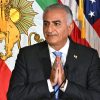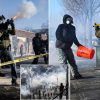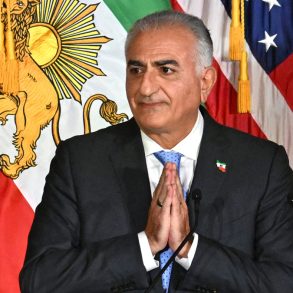The ongoing negotiations between the United States and Iran are centered on preventing Iran from obtaining nuclear weapons. American officials are insisting that Iran sharply limit its uranium enrichment activities. According to a February report by the United Nations nuclear watchdog, Tehran’s uranium enrichment has reached levels approaching weapons-grade, a major concern for the international community.
Steve Witkoff, the Special Presidential Envoy for the Middle East who is overseeing the negotiations, explained that Iran has no legitimate reason to enrich uranium beyond a certain point. “The conversation with the Iranians will be much about two critical points,” Witkoff said. “They do not need to enrich past 3.67 percent.” He added that Iran has enriched uranium to “60 percent” in some circumstances and “20 percent” in others, levels that far exceed what is needed for a peaceful civilian nuclear program.
Negotiators are pressing for a verification system to ensure that Iran cannot secretly push its enrichment to weapons-grade levels. While there have been some signs of progress, many issues remain unresolved. A third round of indirect talks is scheduled for this weekend in Oman, with State Department policy planning director Michael Anton expected to lead the American delegation.
Progress and Challenges in the Talks
So far, the discussions have produced cautious optimism but little concrete progress. Officials reported a positive atmosphere after recent meetings in Rome and Oman, yet both sides continue to hold major differences. Communication between the U.S. and Iran has been conducted through mediators, with representatives often stationed in separate rooms.
Witkoff emphasized that Iran’s claim of maintaining a civilian nuclear program does not justify the high enrichment levels they have been reaching. “You do not need to run, as they claim, a ‘civil nuclear program’ where you’re enriching past 3.67 percent,” he said.
Although Iranian diplomats have hinted at some willingness to compromise, the gap between the two sides remains significant. Without an agreement, the risk of military confrontation grows.
Trump’s Position on the Negotiations
In an interview with Time magazine published Friday, President Donald Trump made it clear that he is determined to prevent Iran from acquiring nuclear weapons by any means necessary. Trump explained, “It’s possible we’ll have to attack because Iran will not have a nuclear weapon.”
Trump also addressed concerns about Israeli Prime Minister Benjamin Netanyahu potentially launching a strike against Iran without American approval. Trump stated, “He may go into a war. But we’re not getting dragged in.” However, he added that if negotiations fail, he is prepared to act. “I may go in very willingly if we can’t get a deal,” Trump said. “If we do not make a deal, I’ll be leading the pack.”
When asked whether he had prevented Israel from attacking Iran’s nuclear sites, Trump denied blocking Netanyahu but admitted he had discouraged action. “I did not make it comfortable for them, because I think we can make a deal without the attack,” Trump said. “Ultimately, I was going to leave that choice to them, but I said I would much prefer a deal than bombs being dropped.”
Trump remains hopeful for a diplomatic solution, but he has made it equally clear that military options are very much on the table.
Trump’s Options Moving Forward
According to U.S. national security adviser Mike Waltz, Trump has several options if negotiations with Iran break down. These include diplomatic pressure, expanded sanctions, and if necessary, targeted military strikes aimed at Iran’s nuclear facilities and missile stockpiles.
Speaking on ABC News’ program “This Week,” Waltz said, “We cannot have a world with the ayatollahs with their finger on the nuclear button.” Waltz warned that an unchecked Iranian nuclear program could spark an arms race across the Middle East, leading other nations to pursue nuclear weapons in response.
Waltz added, “President Trump is determined, one way or another,” to ensure that Iran does not obtain a nuclear weapon.
Trump has also left open the possibility of meeting Iran’s top leaders personally. When asked during his Time magazine interview whether he would meet Supreme Leader Ayatollah Ali Khamenei or President Masoud Pezeshkian, Trump responded, “Sure.”
This willingness to engage face-to-face shows that while Trump is prepared for confrontation, he still prefers a diplomatic outcome if it can be achieved.
Iran’s Position on the Talks
Iran continues to insist that its nuclear program is intended solely for civilian purposes. Tehran has denied that it is seeking to develop nuclear weapons, despite its enrichment activities moving well beyond levels needed for peaceful energy production.
Iranian officials have indicated a limited willingness to agree to verification measures, but so far, they have resisted making the full concessions demanded by the United States and its allies.
The Times of Israel reported that both sides expressed cautious optimism at the conclusion of the last round of talks in Rome, but neither side provided specifics on any areas of agreement.
As the third round of discussions approaches in Oman, Tehran is walking a fine line between keeping its nuclear ambitions alive and avoiding a full-scale military conflict.
Trump’s Criticism of the Biden Administration
In addition to outlining his own strategy, Trump sharply criticized former President Joe Biden’s handling of Iran. Trump argued that by lifting many of the sanctions imposed during his administration, Biden allowed Iran to recover financially and resume funding terrorist organizations.
“There was no money for Hamas. There was no money for Hezbollah. Iran was broke under Trump,” the president said. “When Biden came and he took off all the sanctions, he let China and everybody else buy all the oil, Iran developed three hundred billion dollars in cash over a four-year period,” Trump added.
Trump blamed the Biden administration for allowing Iran to “get back into the game without working a deal,” which he says fueled the resurgence of groups like Hamas and Hezbollah.
Trump pointed specifically to Hamas’ October 7, 2023, attack on Israel, which killed around 1,200 people, including 46 American citizens. He argued that the renewed terrorist activity was a direct result of Iran’s financial recovery under Biden.
President Trump has made it clear that preventing Iran from acquiring nuclear weapons is a top priority. While he hopes a diplomatic deal can still be reached, he has not hesitated to say that if talks fail, he is prepared to take the lead in confronting Iran.
As negotiations continue in Oman, the world will be watching closely to see whether diplomacy can succeed or if Trump will be forced to make good on his promise to “lead the pack.”








